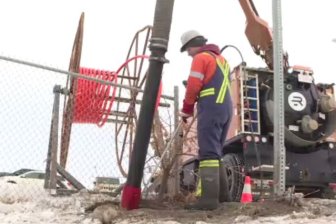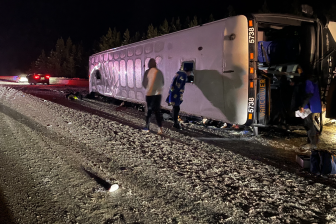From crypto and inflation to Zelenskyy, here’s what stood out in the ABCs of 2022 – National | Globalnews.ca
Just like that 2022 is drawing to a close. And what a year it has been.
This year, like few others, saw the lifting of widespread COVID-19 restrictions and masking in many regions, along with unprecedented challenges to the global order and international law from actors like Vladimir Putin’s Russia and others.
There’s no telling where 2023 will go next, but here’s a look back at some of the top stories, themes and people that made headlines around the world over the last 12 months in alphabetical order.
Although the COVID-19 virus continues to stick around stubbornly, Canadians are now able to go to restaurants, the movies and gather with loved ones during the holidays.
A lot of breakthroughs were made this year when it came to COVID.
In Feb., almost two years into the pandemic, Canada’s border measures loosened. In Aug., Health Canada approved the booster vaccine for children five to 11. In Oct., Pfizer’s bivalent booster targeting Omicron subvariants was given the green light in Canada, followed by the Moderna booster a month later.
However, the pandemic also continued to take its toll this year.
COVID-19 continued to exacerbate Canada’s surgery backlog. In July, a seventh wave of the virus swept across the county.
And with the New Year on the horizon, Dr. Theresa Tam, Canada’s top doctor is warning that 2023 could bring an uptick in COVID-19 activity.
Gas prices have fallen to their lowest all year, leaving Canadians hoping they don’t bounce back up again.
Last summer, unless you were driving an electric car, you were paying more for gasoline in Canada than you ever had to before.
In June, national average gas prices rose to about $2.06 a litre, according to the Canadian Automobile Association. Vancouver hit an eye-watering price of nearly $2.37 while Montreal posted gas prices just shy of $2.24 a litre, according to Gas Wizard.
The spike in price came after the cost of oil increased to US$100 a barrel in late February.
According to Statistics Canada’s latest report, November gasoline prices were down 3.6 per cent on a monthly basis.
Cryptocurrency often made headlines in 2022 – and they weren’t rarely good.
In May, crypto and tech stocks were plummeting. In Oct., Kim Kardashian agreed to pay $1.26 million to settle Securities and Exchange Commission charges that she promoted a cryptocurrency on Instagram without disclosing she’d been paid $250,000 to do so.
In Canada this year, cryptocurrency fraud was “exploding,” according to consumer advocacy groups.
And to top it off, crypto entrepreneur Sam Bankman-Fried agreed to be extradited to the U.S. to face criminal charges related to the collapse of cryptocurrency exchange FTX.
In July, Pope Francis arrived in Canada and delivered a historic apology for residential schools, citing the “deplorable evil” committed by the Roman Catholic Church.
“In the face of this deplorable evil, the church kneels before God and implores his forgiveness for the sins of her children. I humbly beg forgiveness for the evil committed by so many Christians against the Indigenous Peoples,” Francis said.
But there were sentiments missing from his apology, according to some.
Murray Sinclair, who served as the chair of the Truth and Reconciliation Commission of Canada, said the pope’s apology “left a deep hole” by failing to recognize the role the church itself played in the residential school system and instead “placing blame on individual members.”
“It was more than the work of a few bad actors – this was a concerted institutional effort to remove children from their families and cultures, all in the name of Christian supremacy,” Sinclair said.
Canada’s head of state and the longest-reigning monarch in British History, Queen Elizabeth II, died at age 96 this year on Sept. 8 in her Scottish residence at Balmoral Castle.
After being queen for 70 years, she was mourned and celebrated around the world.
Read more:
As Queen’s Platinum Jubilee wraps, governors general reflect on ‘important time’
Read More
-
![]()
As Queen’s Platinum Jubilee wraps, governors general reflect on ‘important time’
Earlier in the year, she had also become the first British monarch to celebrate a Platinum Jubilee.
Global News was on the ground in London during the historic celebrations, which also raised important conversations about the future of the monarchy in Canada and the complex relationship between the Crown and Canada’s Indigenous people.
In late January and through February, the “Freedom Convoy” demonstration against COVID-19 mandates gridlocked downtown Ottawa for three weeks.
Similar demonstrations and blockades emerged in Windsor, Ont., southern Alberta, Winnipeg and Surrey, B.C., along with other places across the country.
Thousands of protesters with hundreds of trucks grinded the capital to a halt and blocked the single most important trade corridor with the United States.
Prime Minister Justin Trudeau invoked for the first time the Emergencies Act to freeze the so-called Freedom Convoy’s funding and dismantle what law enforcement and officials now widely describe as an occupation of the nation’s capital.
Afterward, Canada’s Public Order Emergency Commission spent six weeks listening to residents, police, politicians and protesters about what happened and is now tasked with determining whether the federal government was justified in its invocation of the Emergencies Act.
The final report is due in February.
On Aug. 30 at the age of 91, the last Soviet Union president, Mikhail Gorbachev, died.
Gorbachev oversaw the end of the Cold War without bloodshed, and the nuclear arms race, but couldn’t prevent the collapse of the Soviet Union. However, he won the Nobel Peace Prize.

His death brought contrasting reactions from leaders and other high-profile figures inside and outside of Russia.
Canadian Prime Minister Justin Trudeau said: “Mikhail Gorbachev had an immensely consequential impact on the world.”
Read more:
Mikhail Gorbachev will be ‘sorely missed,’ says former Canadian PM Brian Mulroney
“He helped bring an end to the Cold War, embraced reforms in the Soviet Union, and reduced the threat of nuclear weapons. He leaves behind an important legacy.”
Meanwhile, Lithuanian Foreign Minister Gabrielius Landsbergis said: “Lithuanians will not glorify Gorbachev. We will never forget …that his army murdered civilians to prolong his regime’s occupation of our country.
“His soldiers fired on our unarmed protestors and crushed them under his tanks. That is how we will remember him.”
After battering the Bahamas, Hurricane Fiona took a toll on Atlantic Canada.
The storm made landfall in Nova Scotia on Sept. 24 and ripped through the region, knocking out power to over 500,000 customers in the Maritimes.
Read more:
Hurricane Fiona shows how climate change is fuelling severe weather events in Canada: expert
It also caused hundreds of billions of dollars worth of damage, with estimates so far pegging Hurricane Fiona was the most costly extreme weather event ever recorded in Atlantic Canada in terms of insured damages.
Canadians spent 2022 grappling with the highest levels of inflation seen in nearly 40 years.
By Feb., Statistics Canada said the annual inflation rate across the nation had climbed to 5.7 per cent, while economists warned it hadn’t peaked.
And they were right.
In June, the country’s annual inflation rate peaked at 8.1 per cent and inflation became the focal point of politics.
Although overall inflation has slowed in Canada, Trudeau is warning next year will be “tough” for Canadians as indications grow that Canada could be headed for a recession.
Throughout 2022, much of the world had their eyes on the Johnny Depp and Amber Heard trial.
Depp, 59, sued Heard, 36, for defamations over a 2018 op-ed she wrote for the Washington Post. In the article she referred to herself as a “public figure representing domestic abuse.”

The jury, made up of seven, ruled in favor of Depp and awarded the actor $10 million in damages.
Heard was awarded $2 million in a favourable ruling on one of her three countersuit claims.
After the death of Queen Elizabeth, her son, now King Charles III, became the oldest person to ever assume the throne at the age of 73.
He will be crowned on May 6, 2023 in a ceremony at Westminster Abbey, according to Buckingham Palace.
The government has declared a special public holiday to mark the occasion on Monday, May 8, capping a three-day weekend that will begin with the coronation.
This year has been relentless for lost luggage and travel chaos.
In the summer, airlines and the federal government scrambled to respond to scenes of endless lines, flight disruption, lost luggage and daily turmoil at airports.
The aviation industry blamed the problem on a shortage of federal security and customs officers at the Canada Border Services Agency and the Canadian Air Transport Security.
A surging demand for travel saw delays and cancelled flights continue through Aug., becoming the reality of summer flying.

And that wasn’t the only time this year problems at the airport ensued.
Right before Christmas, a treacherous winter storm wreaked havoc on holiday travel plans with hundreds of flights cancelled or delayed because of weather.
Some passengers were even left stuck on the tarmac for hours, while others were left without power or stranded in hotels or cars as the storm walloped much of the country.
Tesla boss Elon Musk bought Twitter for $44 billion this year.
Since his purchase, Twitter has seen mass layoffs, the banning of journalists and other accounts who covered Musk critically, and the axing of rules put in place to tackle hate speech and misinformation.
In Dec., Musk said he will step down as chief executive officer of Twitter “as soon as I find someone foolish enough to take the job,” but will not leave the company he bought entirely.
Read more:
61% of Canadians say misinformation more likely to spread in Musk’s Twitter: poll
This came after he launched a poll on the platform that asked users whether he should step down as head of Twitter.
Some 57.5 per cent of the more than 17.5 million votes cast were in favour of Musk handing over the reins.
This year was packed full of superhero movies, but maybe it’s time for a break?
In May, “Doctor Strange in the Multiverse of Madness” was released. Two months later, “Thor: Love and Thunder” hit theatres, followed by “The Batman” in March.
Summer blockbusters included “Minions: The Rise of Gru” and “Top Gun: Maverick.”
In Nov., The “Black Panther” sequel, “Black Panther: Wakanda Forever,” scored the second biggest debut of the year, behind Dr. Strange, earning $180 million from ticket sales at more than 4,396 theatres in the U.S. and Canada.
In June, the United States Supreme Court overturned the landmark Roe v. Wade ruling that has guaranteed the right to an abortion for more than 50 years.
While the overturning marked the culmination of decades of work by the religious right in the U.S., the broader implications and outrage over the decision fuelled a wave of turnouts to protect abortion access at the state level amid ballot measures in states like Kansas attempting to further erode access.
Read more:
IN PHOTOS: Here’s how green became the colour of abortion rights
Abortion access also played a major role in the U.S. midterm elections, fuelling turnout and a better-than-expected showing for Democrats across that country.
The legal ramifications of overturning Roe will play out for years as some states attempt to further restrict or ban the healthcare procedure entirely. But a new generation of advocates are fighting back, with the focus increasingly turning to making sure the abortion pill is available by mail.
There’s also been a spike in vasectomy requests in the months since.
In a world-first, a U.S. man with a terminal heart disease was implanted with a genetically modified pig heart in a first-of-its-kind surgery in January.
Unfortunately, two months after the groundbreaking experiment, the Maryland hospital that performed the surgery announced the man had died at age 57.
Doctors didn’t give an exact cause of death, saying only that his condition had begun deteriorating several days earlier.
Quickly – how many thought Russia’s invasion of Ukraine would go poorly.
Instead, fierce Ukrainian fighting has repelled and resisted the rapid advance many expected Russia would carve across the country.

Thousands are dead, but the invasion has rallied the world in support of Ukraine with Canada alone providing roughly $1 billion in military aid and more in financial supports for Ukraine’s economy.
Russian strikes has also left thousands without power this winter as temperatures drop.
And though Russia’s president, Vladimir Putin, says “the sooner the better” when it comes to the end of the war in Ukraine, there are no signs of a conclusion.
Millions fled Ukraine as the war battered their home.
In May, hundreds of Ukrainian refugees landed in Canada on the first of three federally chartered flights to bring people fleeing Russia’s invasion to the country.
This December, some marked their first Christmas in Canada after leaving Ukraine.
Protests in Sri Lanka are one example out of a year that saw demonstrations in countries around the world where people demanded change and accountability from their governments.
In Sri Lanka, President Gotabaya Rajapaksa and Prime Minister Ranil Wickremesinghe conceded to demands from protesters to resign over corruption and mismanagement that has led to the country’s deepening crisis.
At one point, protesters even occupied the president’s home.
Demonstrations also took place in Iran over the death of Mahsa Amini – a 22-year-old Kurdish-Iranian woman, who died after falling into a coma while in the custody of Iran’s “mortality police” on Sept. 16.
Read more:
1 month after Mahsa Amini’s death in Iran, what has Canada done so far?
She was being held for not wearing her hijab properly, labeled as “inappropriate attire,” according to the rigidly enforced Islamic Penal Code.
Iran was ousted from a United Nations women’s group for policies contrary to the rights of women and girls in December after months of Tehran’s crackdown on protests.
In China, protests also broke out over the country’s “zero-COVID” policy for its handling of the COVID-19 pandemic.
On Nov. 29, Prime Minister Justin Trudeau said Canada supports protesters in China who have been “expressing themselves” in opposition to the “zero-COVID” policies of Beijing over recent weeks.
Haiti saw terrible unrest in 2022 as gangs have paralyzed the Caribbean country by blocking access to roads, fuel and essentials.
Canada imposed multiple sanctions targeting those it accuses of empowering gangs.
In December, the government sanctioned three Haitian elites by freezing Canadian assets held by Gilbert Bigio, Reynold Deeb and Sherif Abdallah – three of Haiti’s richest men.
Canada also sanctioned two of Haiti’s cabinet ministers earlier in the month.
On May 24 in Uvalde, Texas 19 children and two teachers were killed inside a classroom at Robb Elementary School.
Since then, the inaction from law enforcement has been intensely scrutinized.
In July, a nearly 80-minute hallway surveillance video published by the Austin American-Statesman publicly showed for the first time — with disturbing and painful clarity — a hesitant and haphazard tactical response by fully armed officers that the head of Texas’ state police has condemned as a failure and some Uvalde residents have blasted as cowardly.
It has also been announced by the city’s mayor that the elementary school where the shooting took place will be demolished.
In November, Mauna Loa, Hawaii’s biggest volcano erupted for the first time in 40 years.
Mauna Loa, which takes up more than half of the Big Island and rises 4,169 metres above the Pacific Ocean, last erupted in March and April of 1984, sending a flow of lava within eight kilometres of the city of Hilo.

In southwest Iceland, a volcano also began erupting in Aug. near the international airport.
This came just eight months after its last eruption officially ended.
In Jan. in the Pacific nation of Tonga, a violent volcano eruption also occurred with a subsequent tsunami near the islands following afterward.
W is for ‘What was he thinking?’
Donald Trump, Novak Djokovic, Will Smith – what were they thinking?
In August, FBI agents searched Trump’s Florida home and found top secret records in an office and storage room, along with empty folders with classified banners on them and more than 10,000 government records without any classification markings at all.
Though the U.S. Justice Department did not describe the contents of the documents, it showed the extent to which classified information including material at the top-secret level was stashed in boxes at the home and commingled among newspapers, magazines, clothing and other personal items.
Read more:
Trump-requested ‘special master’ review of seized documents must end: U.S. court
Star tennis player Djokovic also ended up in detention in Australia this year after a supposed mistake on his entry visa.
He was eventually deported from the country after the government decided to uphold its decision to cancel his visa over the country’s COVID-19 entry rules and his unvaccinated status.
During this year’s Oscars ceremony, after Chris Rock made a joke at the expense of Smith’s wife, Jada Pinkett Smith, Smith strode from his front-row Dolby Theatre seat on to the stage and smacked Rock.
Moments later, he went on to win the best actor award for his role in King Richard.
Smith has since resigned from the motion picture academy and was banned from attending the award show for 10 years. His name also made the top ten list for most viral web searches in Canada this year.
X is for Ex-Prime Minister
This year, the U.K. had three different prime ministers in less than two months.
At the beginning of July, Boris Johnson resigned as Britain’s prime minister, bringing an end to one of the rockiest tenures for a world leader in modern times after a series of scandals rocked his government’s confidence in him.
After Johnson came Liz Truss in September, who then resigned in October following controversy over her economic plan, making her the shortest-serving prime minister in British history.

When announcing her resignation, Truss said she accepted that she could not deliver on the promises she made when she sought the job, and having lost the faith of her party.
In October, Rishi Sunak, one of Britain’s wealthiest people, became England’s first prime minister of colour and the youngest world leader in the G20 at 42 years old.
Here’s a look into his $1.1 billion fortune.
Although yonder isn’t a word used very frequently, the James Webb telescope let us look further across the universe than we’ve ever seen before.
By picking up infrared light, Webb can see objects that are so far away, the light they emit takes over 13.5 billion years to reach Earth.
Read more:
James Webb telescope shows Neptune like you’ve never seen it before
That means Webb is also like a time machine in that it can see what the universe looked like back when the earth and sun were formed.
The first photos from its lens were revealed this year, offering the sharpest, clearest look into the history of the universe.
The telescope also offered new glimpses into the makeup of planets Jupiter and Neptune.
Z is for Volodymyr Zelenskyy
Finding a word for the letter “Z” can be tricky but this year that most definitely isn’t the case. Ukrainian President Volodymyr Zelenskyy has led his country through a fierce battle this year.
Earlier in December, he was named Time magazine’s person of the year in a nod to his fearless leadership.
Since Russia launched its offensive against Ukraine on Feb. 24, Zelenskyy has been rallying support for his country and has hosted several world leaders on Ukrainian soil in recent months.
Zelenskyy, a former comedian and actor, has remained in the capital of Kyiv throughout the invasion, despite increasing bombardments and threats of Russian forces breaching the capital.
— With files from Global News’ Mike Armstrong, The Canadian Press and Reuters
For all the latest World News Click Here
For the latest news and updates, follow us on Google News.







